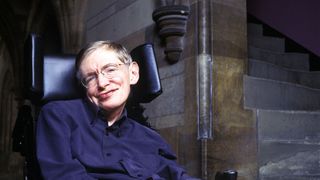Stephen Hawking warns AI could ‘conceivably destroy’ civilization
But it’s not all doom and gloom

Professor Stephen Hawking has warned that the creation of artificial intelligence “could be the worst event in the history of our civilization” at the Web Summit technology conference in Lisbon, Portugal.
But it’s important to note, as with many of Hawking’s frankly terrifying predictions, that he’s postulating about the negative possibilities, not certainties. In the speech he spoke with as much optimism as he did caution:
“Success in creating effective AI, could be the biggest event in the history of our civilization. Or the worst. We just don't know," he said, "So we cannot know if we will be infinitely helped by AI, or ignored by it and side-lined, or conceivably destroyed by it."
It’s easy to be drawn to the negatives, especially as there are more of them, but Hawking himself didn’t seem dispirited at the possibility of the creation of AI:
“I am an optimist and I believe that we can create AI for the good of the world,” Hawking continued, “That it can work in harmony with us. We simply need to be aware of the dangers, identify them, employ the best possible practice and management, and prepare for its consequences well in advance,"
Regulate the robots
This is a recurring theme whenever a figurehead in the tech world warns us about the dangers of AI. We're frequently told that the idea of it in and of itself isn’t to be feared, just that we need to make sure there is solid regulation in place.
One thing that is interesting is that Hawking laid out some of the potential dangers, and they are far more down-to-earth than the sci-fi ‘What if we become slaves to the robots’ thinking around AI:
Get daily insight, inspiration and deals in your inbox
Sign up for breaking news, reviews, opinion, top tech deals, and more.
"Unless we learn how to prepare for, and avoid, the potential risks, AI could be the worst event in the history of our civilization. It brings dangers, like powerful autonomous weapons, or new ways for the few to oppress the many. It could bring great disruption to our economy."
And while he did say that "computers can, in theory, emulate human intelligence, and exceed it,” he also spoke about the potential good that AI can do to transform society, eradicating poverty and disease, and even reversing the damage done to the planet.
- Want more about the rise of the bots? Check out: What happens when our assistants are smarter than us?
Via CNBC
Andrew London is a writer at Velocity Partners. Prior to Velocity Partners, he was a staff writer at Future plc.
